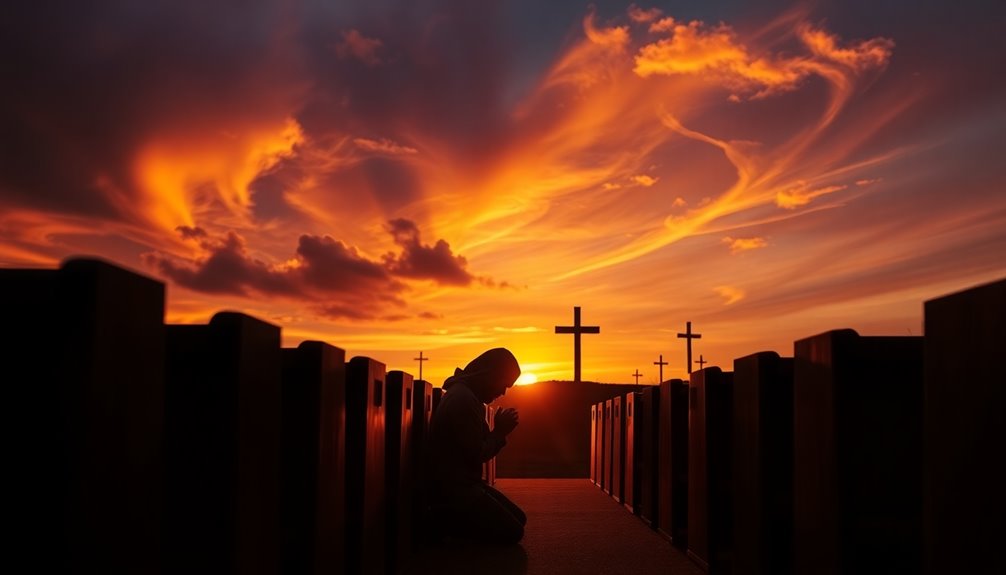The Second Coming of Jesus Christ is a crucial event in Christian belief, meant to be taken seriously. It's described in the Bible as a visible, transformative moment where Christ returns to gather the faithful and judge the unrighteous. This event encourages you to live a holy life and stay vigilant against false teachings. It's grounded in scripture, urging a readiness that includes daily prayer, reflection, and community engagement. Understanding the signs and the significance of this moment can enhance your spiritual preparedness. Discovering more about the implications and your role can deepen your faith and readiness for this ultimate fulfillment.
Key Takeaways
- The Second Coming is a literal, visible event where Jesus returns to fulfill God's divine plan and judge humanity.
- Believers are encouraged to live holy lives and prepare spiritually through prayer, scripture reflection, and community engagement.
- Key biblical passages outline the signs, resurrection of the righteous, and the gathering of believers at Christ's return.
- Understanding Jewish eschatological beliefs enhances the context of the Second Coming and emphasizes ethical living in anticipation.
- The Rapture, distinct from the Second Coming, involves the transformation of living believers, with varying views on its timing and significance.
Introduction

When it comes to the Second Coming of Jesus Christ, many people look for answers and guidance. This event isn't just a metaphor; it's described in the Bible as a literal, personal, and visible occurrence that will change everything. The coming of the Lord will culminate in the resurrection of the righteous and the final judgment of the unrighteous, fulfilling the prophecies in the Bible that many believers hold dear.
You might feel a mix of anticipation and anxiety about what this means for your faith. The blessed hope of Christ's return serves as a powerful motivator for you to live a holy life. In the face of wars, natural disasters, and the rise of false prophets, you're encouraged to remain vigilant and steadfast in your beliefs. This isn't just about waiting; it's an active preparation.
Jesus calls you to share the Gospel and align your life with His teachings, reminding you that the establishment of God's Kingdom on earth is part of this promise. As you reflect on these truths, consider how they shape your daily actions and faith journey.
Essential Biblical References

When exploring the Second Coming of Jesus Christ, you'll find key biblical references that provide clarity and insight.
Primary scriptures like Matthew 24:30 and Revelation 19:11-16 paint a vivid picture of His return and its significance.
Additionally, secondary references can enrich your understanding of the event and its implications for believers.
Primary Bible References
The Bible provides essential references that outline the Second Coming of Jesus Christ, offering believers a clear understanding of this pivotal event.
Acts 1:11 assures you that Jesus will return in the same manner as His ascension, promising a visible and personal return.
Matthew 24:30-31 describes the second coming of Jesus as a global event, where the Son of Man will appear with angels to gather His elect. This emphasizes the return of Christ as a momentous occasion affecting everyone worldwide.
Revelation 1:7 proclaims that every eye will see Jesus upon His return, highlighting the universal recognition of His coming.
Meanwhile, 1 Thessalonians 4:16-17 outlines the resurrection of the dead in Christ, along with the transformation of living believers who'll meet the Lord in the air during the Rapture. This moment marks the fulfillment of hope for many.
Lastly, Zechariah 14:4 specifies that Jesus will stand on the Mount of Olives at His return, underscoring the prophetic significance of this location in the Second Coming narrative.
Collectively, these verses form a powerful foundation for understanding this monumental event.
Secondary Bible References
Building on the foundational verses that highlight the Second Coming of Jesus Christ, several secondary references further enrich our understanding of this significant event. Acts 1:11 assures us that Jesus will return in the same way He ascended into heaven, emphasizing the literal aspect of the Second Coming.
In Matthew 24:30, we learn that this event will be visible for all to see, marked by "the sign of the Son of Man," causing all tribes of the earth to mourn.
1 Thessalonians 4:16 adds depth by indicating that the Lord will descend from heaven with a shout, orchestrating the resurrection of believers, who'll rise first.
Revelation 1:7 reinforces this global visibility, proclaiming that every eye will see Him upon His return.
Lastly, Matthew 24:14 connects the urgency of evangelism to the Second Coming, highlighting the need to preach the gospel to all nations before the end comes.
These secondary Bible references collectively paint a vivid picture of the Second Coming, urging you to reflect on your readiness for this momentous event.
Jewish Eschatological Beliefs

Frequently, Jewish eschatological beliefs focus on the anticipation of a Messiah who'll restore Israel and usher in a period marked by peace and divine justice. This figure is expected to bring about significant transformation, leading to a time when ethical living and adherence to God's commandments are paramount.
Traditional texts, such as the Tanakh, outline a future resurrection of the dead and a final judgment for all humanity, where the righteous are rewarded, and the wicked face consequences.
The concept of the "World to Come" (Olam Ha-Ba) plays a crucial role in Jewish thought, representing a future time of spiritual fulfillment following the messianic age and resurrection.
While many contemporary Jewish thinkers interpret these eschatological prophecies metaphorically—focusing on social justice and world improvement—there remains a strong foundation in the belief that ethical living prepares individuals for the coming of the Messiah and the final judgment.
This emphasis on morality encourages you to engage in actions that reflect justice and compassion in your daily life, aligning with the broader Jewish hope for a future filled with peace and divine righteousness.
Theological Significance of Rapture

Understanding Jewish eschatological beliefs provides a foundation for exploring Christian perspectives on end times, particularly the concept of the Rapture. The Rapture, derived from the Greek word "harpazo," describes the moment when living Christians are transformed and caught up to meet the Lord, as outlined in 1 Thessalonians 4:17.
Predominantly supported by pretribulational premillennialists, this event is seen as distinct from the Second Coming of Jesus, which follows a period of tribulation.
For many believers, the Rapture serves as a source of comfort, emphasizing that it's a reward for faithful living rather than a judgment for salvation. This perspective motivates you to live a holy life, knowing that Jesus is coming to gather those who've remained steadfast.
However, the theological implications of the Rapture have sparked significant debate, particularly among traditional denominations like Catholic and Eastern Orthodox churches, which reject this interpretation.
Critics argue that the Rapture can create fear and anxiety about abandonment among believers, leading to psychological challenges.
Nonetheless, for those living at the time of the Rapture, it represents hope and assurance in their faith journey.
Misunderstanding Rapture Timing

When it comes to the timing of the Rapture, there are plenty of misconceptions out there.
You might find yourself confused by the different views, especially between pretribulation and post-tribulation beliefs.
Understanding these perspectives can help clarify how they relate to the Second Coming and what that means for you.
Dispelling Common Misconceptions
Many people conflate the Rapture with the Second Coming of Jesus Christ, leading to significant misunderstandings about its timing and nature.
It's important to note that many premillennialists view the Rapture as a distinct event that happens before the tribulation period, rather than simultaneously with the Second Coming. This misconception can confuse believers, especially since various interpretations exist, such as pre-tribulation and mid-tribulation views.
Additionally, many traditional Christian denominations, including Catholic and Eastern Orthodox churches, reject Rapture theology altogether. They see it as a modern development rather than an established doctrine.
This further complicates the conversation, as differing perspectives on the Rapture create misconceptions about its significance in Christian eschatology.
Key scriptural references, like 1 Thessalonians 4:17, use terms like "caught up," which can lead to varying translations and interpretations.
Notable early church figures contributed to Rapture theology, showcasing its relatively recent emergence in Christian thought.
Timing of the Rapture
The timing of the Rapture often sparks heated debates among Christians, as differing interpretations create confusion. Some believe it happens before the Great Tribulation, while others argue it occurs during or even after this turbulent period.
Premillennialists typically support a pre-tribulation view, whereas amillennialists and postmillennialists reject this two-stage return concept altogether.
It's crucial to note that the exact time of the Rapture remains unknown, as highlighted in Matthew 24:36. This uncertainty emphasizes the need for vigilance among believers, regardless of their views on timing.
Historical predictions about the Rapture, such as those by William Miller and Charles Taze Russell, have often led to disappointment when they failed to materialize.
The concept gained traction in the 19th century, particularly with the rise of dispensational premillennialism, influenced by figures like Edward Irving and later popularized by authors like Hal Lindsey and Tim LaHaye.
These varying interpretations can lead to misunderstandings, but what remains clear is that when Jesus comes, believers are called to be ready, no matter which timing theory they subscribe to.
Daily Spiritual Preparedness Practices

To stay spiritually prepared for the Second Coming, you need to engage in daily prayer and reflection.
This practice not only deepens your relationship with God but also helps you remain attuned to His guidance.
Additionally, participating in group fellowship activities strengthens your faith and fosters a sense of community among believers.
Daily Prayer and Reflection
Daily prayer and reflection are essential practices that keep you spiritually attuned as you prepare for the Second Coming of Jesus Christ. Engaging in daily prayer fosters a continuous connection with God, encouraging your spiritual growth and deepening your faith. As you pray, remember to reflect on scripture; passages like Matthew 24:42 remind you to stay vigilant and hopeful as you await Christ's return.
Incorporating moments of silence and meditation during your prayer can enhance your spiritual readiness. This quiet time allows you to listen for God's guidance and contemplate your personal faith journey, as noted in Psalm 46:10.
You might also consider maintaining a prayer journal, which can be a valuable tool for documenting your prayers, reflections, and insights. This practice not only tracks your spiritual growth but also helps you recognize answered prayers over time.
While individual prayer is vital, communal prayer with fellow believers can further strengthen your faith. Just as the early Christians gathered in prayer in Acts 1:14, you too can find support and encouragement in a collective spiritual environment as you prepare for the promised return of Christ.
Group Fellowship Activities
Engaging in group fellowship activities can profoundly enhance your spiritual preparedness for the Second Coming of Jesus Christ. When you participate in group Bible studies or fellowship meetings, you deepen your understanding of the teachings surrounding Christ's return. Discussing these vital topics with others fosters encouragement and accountability, reminding you that the coming is near and that you need to be ready to meet the Lord.
In addition to studying scripture together, practicing acts of service and evangelism as a group embodies the call to preach the gospel to all nations, as highlighted in Matthew 24:14. This collaborative effort not only strengthens your bond but fulfills a crucial mission.
Regular self-reflection and repentance within your group help align your lives with biblical teachings, preparing your hearts for Christ's return.
Moreover, supporting one another in living out Christian values reinforces hope amidst challenges. By committing to these group activities, you create a community that inspires and motivates each member, ensuring that you all remain vigilant and spiritually prepared as you await the glorious day of the Lord's return.
Eager Anticipation of Christ's Return

Eager anticipation fills the hearts of many Christians as they await the return of Jesus Christ, a pivotal event in their faith. This expectation is deeply rooted in scripture, where believers are encouraged to remain vigilant and prepared, as highlighted in Matthew 24:42-44. The Second Coming is seen as a time when Jesus will return in power and great glory, fulfilling the promises made by God.
Scriptural prophecies, such as those in Zechariah 14:4 and Matthew 24:30, outline significant signs and events that will precede this momentous occasion. These signs foster a sense of hope among followers, reminding them that they're part of a divine plan. Many see the Second Coming as the ultimate culmination of their faith, instilling a sense of purpose as they look forward to the establishment of God's kingdom on earth.
The popularization of Rapture theology, notably through Tim LaHaye's "Left Behind" series, has further heightened this eager anticipation among contemporary believers.
As they witness the unfolding of events around them, their hope for Christ's return grows ever stronger, reinforcing their commitment to live in readiness for that glorious day.
Additional Resources

Accessing additional resources can greatly enhance your understanding of the Second Coming of Jesus Christ and its significance in Christian faith. Books like "The Second Coming: Signs of Christ's Return and the End of the Age" by John MacArthur offer great insights into the prophetic context surrounding the second coming.
If you want to dive deeper, consider online Bible study platforms like Logos, where you'll find an array of resources, commentaries, and tools that help clarify the Word of God on eschatological teachings.
For a more academic approach, "Understanding End Times Prophecy" by Paul N. Benware can clarify various interpretations related to the Rapture and the Second Coming. Additionally, the "Left Behind" series by Tim LaHaye has made these concepts more accessible through engaging literature and film adaptations.
Joining study groups or church classes focused on eschatology can also be beneficial. These communities provide a space for discussion, allowing you to explore the implications of the coming of Jesus Christ for your personal faith and readiness.
Don't hesitate to engage with these resources; they can significantly enhance your understanding of end times prophecy.
Frequently Asked Questions
What Are the Biblical Signs of the Second Coming?
The biblical signs of the Second Coming include wars, famines, and earthquakes, which signal the start of the last days.
You'll notice nations rising against nations and increasing natural disasters.
False prophets will emerge, leading many to lose their love for one another.
The restoration of Israel and the gospel spreading to all nations are also key indicators.
These signs urge you to stay alert and prepared for Christ's return.
How to Be Ready for Jesus' Second Coming?
To be ready for Jesus' Second Coming, you need to engage in daily prayer and spiritual practices that deepen your relationship with God.
Study biblical prophecies to recognize the signs of the times, and strive to live a life of holiness and obedience.
Share the gospel with others, as it's essential to spread His message.
Maintain a mindset of vigilance and expectancy, staying spiritually alert for His imminent return.
What Does Jesus Say About the Second Coming?
Jesus emphasizes the unexpected nature of His Second Coming, stating that no one knows when it'll happen—not even the angels.
He describes a visible return, where all nations will see Him in the clouds. To prepare, you're urged to stay vigilant, as illustrated by the parable of the ten virgins.
Signs like wars and famines indicate its nearness, but ultimately, He promises to return for those who believe in Him.
What Does the Bible Say About Being Ready for the Coming of Jesus?
The Bible emphasizes that you need to be ready for Jesus' return. In Matthew 24:42, you're urged to stay vigilant since you don't know when He'll come.
1 Thessalonians 4:16-17 reassures you that believers will be transformed to meet Him.
The parable of the ten virgins highlights the importance of spiritual preparedness. Since no one knows the exact time of His coming, living a faithful and holy life is essential for you.










